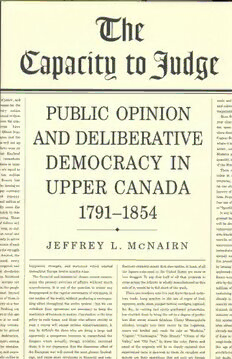
The Capacity To Judge: Public Opinion and Deliberative Democracy in Upper Canada,1791-1854 PDF
Preview The Capacity To Judge: Public Opinion and Deliberative Democracy in Upper Canada,1791-1854
THE CAPACITY TO JUDGE: PUBLIC OPINION AND DELIBERATIVE DEMOCRACY IN UPPER CANADA, 1791-1854 This page intentionally left blank JEFFREY L. McNAIRN The Capacity to Judge Public Opinion and Deliberative Democracy in Upper Canada, 1791-1854 UNIVERSITY OF TORONTO PRESS Toronto Buffalo London www.utppublishing.com University of Toronto Press Incorporated 2000 Toronto Buffalo London Printed in Canada ISBN 08020-4360-7 (cloth) Printed on acid-free paper Canadian Cataloguing in Publication Data McNairn, Jeffrey L., 1967- The capacity to judge : public opinion and deliberative democracy in Upper Canada, 1791-1854 Includes bibliographical references and index. ISBN 0-8020-4360-7 1. Representative government and representation - Ontario - History- 19th century. 2. Constitutional history- Ontario. 3. Ontario - Politics and government - 19th century. 4. Public opinion - 3 )litical aspects - Ontario - History - 19th century. I. Title. FC3071.2.M36 2000 971.3'02 coo-930420-7 F1058.M36 2000 University of Toronto Press acknowledges the financial assistance to its publishing program of the Canada Council for the Arts and the Ontario Arts Council. This book has been published with the help of a grant from the Humanities and Social Sciences Federation of Canada, using funds provided by the Social Sciences and Humanities Research Council of Canada. University of Toronto Press acknowledges the financial support for its publishing activities of the Government of Canada through the Book Publishing Industry Development Program (BPIDP). Revolutions do not arise from what men suffer, but from what they think. William Lyon Mackenzie, 1837 This page intentionally left blank Contents PREFACE ix Introduction 3 Part One: Creating a Public 1 'The very image and transcript': Transplanting the Ancient Constitution 23 2 Experiments in Democratic Sociability: The Political Significance of Voluntary Associations 63 3 'The most powerful engine of the human mind': The Press and Its Readers 116 4 A united public opinion that must be obeyed': The Politics of Public Opinion 176 Part Two: Debating the Alternatives 5 'We are become in every thing but name, a Republic': The Metcalfe Crisis and the Demise of Mixed Monarchy 237 6 Publius of the North: Tory Republicanism and the American Constitution 272 7 Mistaking 'the shadow for the substance': Laying the Foundations of Parliamentary Government 304 viii Contents 8 'Its success ... must depend on the force of public opinion' Primogeniture and the Necessity of Debate 360 Conclusions and Speculative Questions 411 BIBLIOGRAPHY OF PRINTED PRIMARY SOURCES 439 ILLUSTRATION CREDITS 449 INDEX 451 Illustrations follow page 220 Preface It has become increasingly common, even fashionable, to lament the poverty of public debate in Canada and to complain about the seeming inability or unwillingness of our political institutions and leaders to respond to public opinion. Such comments betray a number of assump- tions: that widespread public debate is a vital sign of national health; that a sizeable number of Canadians are able and willing to engage in reasoned and informed debate; that such debate contributes to resolv- ing political and social conflict; and that, once such debate has taken place, constitutional, legal, and political structures ought to reflect its conclusions. Whatever the current practice, such assumptions remain at the core of our democratic beliefs. They are, however, of relatively recent origin. What we are prone to take for granted as obvious and widely shared assumptions were once highly contested propositions; dis- missed as risible or denounced as revolutionary. Understanding how these assumptions developed is vital to assessing their continued relevance and reminds us why they were once thought so important. Focusing on the colony that became Ontario, this book asks what made widespread public debate possible; why it came to be seen as desirable, even essential; and how it was integrated into the prov- ince's constitutional and social identity. Despite fits of forgetfulness, we remain heirs of this story. In the text that follows, I have tried to let contemporaries speak for themselves. Aware of the processes they participated in, they cared pas- sionately about politics. As a result, I have used direct quotations exten- sively. Faithful to their meaning, I have not always retained their punctuation or littered my transcriptions with square brackets and the
